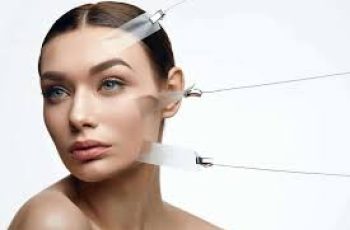
What Do Copper Peptides Do?
If you’ve been around these parts for a while, you’ll know there are some effective skincare ingredients that aren’t as well-known as certain household names, such as hyaluronic acid or vitamin C, but do in fact play an important role in keeping your skin healthy. Now, don’t panic if you have no idea what copper peptides are and what they do, as this is exactly what we will find out today.
What are copper peptides?
Peptides naturally occur in the skin and are part of the short chains of amino acids that are found in the lower layers of the skin. They help with the production of collagen and elastin which is responsible for the tissues in the skin that ensure you are left with smoother, firmer and youthful looking complexion. By stimulating the production of collagen and elastin you will target concerns such as, fine lines, enlarged pores and hyperpigmentation. Not to mention the added hair benefits you can expect when supplementing copper peptides into your daily routine.
What are the main skincare benefits of copper peptides?
Combats signs of ageing- with the boost in collagen the skin is left plumped and youthful
Reduces signs of pigmentation- packed with antioxidants copper peptides can target signs of pigmentation, such as sun damage, dark spots, hyperpigmentation, and age spots
Increase blood flow- with an increase in blood flow, you’ll find surface wounds are healed quickly as well as an stimulating the hair follicles boosting hair growth
How often should you use copper peptides?
It is considered by many skincare experts that copper peptides can be used every day, in fact, if your skin type allows it, you can use them twice a day. These peptides can absorb into the skin which although is beneficial for some skin types, for those prone to sensitivity and dryness can result in some unwanted side effects.
Because of this it is best to team copper peptides with other hydrating and nourishing skincare products that are already established into your daily routine.
Are copper peptides worth it?
Yes, they are, as long as you are using them correctly and your skin is not showing any signs of irritation. Copper peptides are a hard-working, multi-talented skincare ingredient that is easily used in conjunction with other more potent skincare formulations. Many believe that teaming them together will supercharge your everyday skincare routine and show impressive results quickly and effectively.
What do copper peptides do for skin?
As surprising as this may sound, there is no clear evidence demonstrating how exactly copper peptides work on the skin. But there are many options on how they benefit the skin, just like the ones I have mentioned previously.
With the boost in collagen and elastin production you will see an impressive improvement in the overall appearance of the complexion. As for the antioxidant benefits, they work alongside helping to repair skin damage whilst protecting the skin surface from further damage caused from exposure to free radical damage. You will also find that thanks to the increase of blood flow resulting in wounds being healed quickly, those prone to frequent acne breakouts will be able to regulate the blemish causing bacteria.
What should you not use copper peptides for?
Although it is considered that copper peptides are easily added into anyone’s daily skincare routine, there are some potent ingredients that should be avoided being used at the same time as copper peptides.
Vitamin C
Retinol
Alpha Hydroxy Acids (AHA) such as glycolic acid
This is because of how effective copper peptides are at absorbing into the skin which can often result in signs of irritation. Just to make things clear, you can use these ingredients with copper peptide products, it is just the case of alternating when you apply them and leaving enough time in between applications to avoid an unwanted reaction.
What can I mix with copper peptides with?
There are several skincare ingredients that can be mixed with copper peptides. The easiest way to figure out which is the most effective are hydrating and nourishing active ingredients, such as hyaluronic acid, niacinamide and rich blends of facial oils. As I have already mentioned it is best to avoid using copper peptides directly with chemical exfoliants, retinoids and vitamin C.
If you ever have any concerns with introducing copper peptides into your daily routine, I suggest consulting with a doctor or dermatologist to ensure you and your skin will benefit. Not forgetting of course, to perform a patch test for 24 hours before applying any product over the face.
Do peptides actually work?
Yes, peptides actually work, the reasons why they work however is still a little unclear. Peptides have been known for slowing down the ageing process on the skin, reducing any signs of inflammation and regulating the skin’s microbiome reducing the risk of bacteria creating frequent breakouts. With amino acids being constantly present in the skin, peptides are a skincare ingredient that will benefit the complexion in every way, without any of the hype usually surrounding trending ingredients.
How long does it take for peptides to work? With consistent application with other proven and effective ingredients you can expect to see results on the skin as early as a few weeks. For an all-over improvement with a smoother, younger complexion it’ll take roughly three to six months. So, there you have a little more information about what copper peptides do. Once you have established whether you should introduce these clever ingredients into your routine. It is a simple case of finding the best product formulation that will work for you. When layering skincare products, it is said to start with the thinnest consistency and work your way up to the thickest allowing each active ingredient to absorb into the skin. You’ll find that peptides are found in moisturisers and serums mainly. This ensures they are easily combined with other ingredients and can absorb into the skin effectively and working in the lower layers of the skin. Don’t forget to join us on Instagram if you have any questions.
DQH Can I use salicylic acid first and then vitamin C?
It’s easy to create a skincare routine, but knowing how to use it is another thing entirely. In most cases, if you’re not getting the desired skin results, it could be due to the layering of conflicting ingredients. So, is it possible that salicylic acid and vitamin C are such ingredients? Or are these active ingredients the duo that’s been missing from your skincare routine? If you want answers, stick around because today we are going to explain the benefits of salicylic acid and vitamin C and how they can be used in your daily life.
What are the benefits of salicylic acid for skin?
Salicylic acid is one of the most commonly used beta hydroxy acids and is favored by many people with oily, acne-prone skin. This acid is derived from willow bark, and unlike its water-soluble relatives (called alpha-hydroxy acids), salicylic acid is oil-soluble, which means it can penetrate deeper into the lower layers of the skin. Once it reaches the lower layers, it can help unclog pores of excess sebum, dirt, bacteria, debris, and impurities. This results in clearer skin tones and greater definition.
Not only does salicylic acid benefit the underlying layers, but the outer surface of the skin benefits as well. When applied to the skin, salicylic acid removes the buildup of dead skin cells. This is accomplished by breaking the bonds that hold dead cells to the surface. Over time, this can cause the complexion to look dull and prone to acne, blackheads, and other blemishes.
If you’d like to learn more about salicylic acid and how it can improve your skin, check out this dedicated blog post from a beauty insider.
What are the benefits of vitamin C for skin?
Vitamin C is considered one of the most powerful antioxidants, which means it is very effective at fighting free radicals and preventing them from causing further skin damage. Examples of free radicals include pollution, central heating, UV rays and harsh climate. They attack proteins, fats and cell membranes as soon as they come into contact with the skin, causing signs of premature aging such as fine lines and wrinkles as well as hyperpigmentation, flaky patches of skin and loss of elasticity.
Many people usually prefer to use vitamin C in their morning routine as this ingredient gives the complexion a radiant glow. You’ll also find that vitamin C can target areas of hyperpigmentation, plumping the skin and reducing the appearance of fine lines and wrinkles.
The thing about vitamin C is that there are a lot of outdated studies going back to the 1950s that describe vitamin C as an unstable skin component. Thanks to improvements in modern technology, this is no longer the case as all products now contain a stable form of vitamin C.
Visit The Beauty Insider to learn more about vitamin C. So please check out our blog post.
Can I use salicylic acid first and then vitamin C?
Yes, you absolutely can. In fact, it’s thought that using salicylic acid before using vitamin C ensures it penetrates faster and works faster.
This is an efficient way to utilize two power sources, and the reason has to do with pH. For example, the skin’s natural pH is about 4.7, making it slightly acidic. Salicylic acid and vitamin C are also both acidic, and you’ll find that vitamin C is absorbed quickly into the skin. Therefore, using salicylic acid beforehand can increase the acidity of the skin and allow vitamin C to penetrate into the skin faster.
While this is considered an effective way to combine two powerful ingredients, you need to be aware of your skin type and how it reacts to certain active ingredients. Even people with perfect, normal skin can experience skin sensitivity and irritation. Therefore, always consult a doctor or dermatologist before using any new products on your skin.
It’s also important to follow skin application rules. In this case, you need to use the product correctly to ensure you get the best results for your skin. If you’re not sure what I mean, the basic rule for skin is to start with the thinnest consistency and work your way up to the thickest consistency. This prevents a barrier from forming on the surface, preventing other active ingredients from penetrating the skin.
Can I use salicylic acid at night and vitamin C in the morning?
Yes, absolutely, this is considered the most effective way to get returns without any adverse side effects. This is because there is enough time between applications to ensure that the skin’s pH levels return to balance.
You’ll also find that Vitamin C is rich in antioxidants and is perfect for use in the morning to ensure your skin is protected and looking its healthiest. Due to the small size of salicylic acid molecules, it is an acid that is able to reach the deepest parts of the skin. While this is effective at keeping skin clear, it also increases the risk of irritation and photosensitivity. Therefore, many people prefer to use powerful BHAs in their evening routine without exposure to UV rays, pollution, or harsh weather.
Warning: If you avoid using sunscreen every day, none of these ingredients will do what your skin needs. The combination of chemical peels and powerful ingredients increases the risk of further damage to the skin’s surface. Use SPF 50 every day to keep your skin protected and your lipid barrier healthy, even on cloudy days, keeping your skin in top condition.


